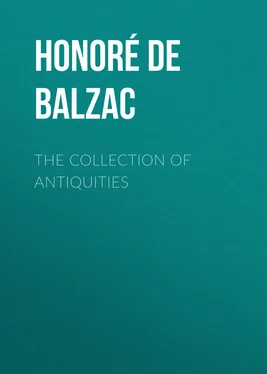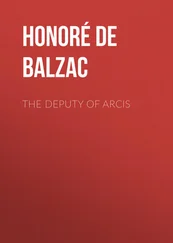Honoré Balzac - The Collection of Antiquities
Здесь есть возможность читать онлайн «Honoré Balzac - The Collection of Antiquities» — ознакомительный отрывок электронной книги совершенно бесплатно, а после прочтения отрывка купить полную версию. В некоторых случаях можно слушать аудио, скачать через торрент в формате fb2 и присутствует краткое содержание. Жанр: literature_19, foreign_antique, foreign_prose, на английском языке. Описание произведения, (предисловие) а так же отзывы посетителей доступны на портале библиотеки ЛибКат.
- Название:The Collection of Antiquities
- Автор:
- Жанр:
- Год:неизвестен
- ISBN:нет данных
- Рейтинг книги:5 / 5. Голосов: 1
-
Избранное:Добавить в избранное
- Отзывы:
-
Ваша оценка:
- 100
- 1
- 2
- 3
- 4
- 5
The Collection of Antiquities: краткое содержание, описание и аннотация
Предлагаем к чтению аннотацию, описание, краткое содержание или предисловие (зависит от того, что написал сам автор книги «The Collection of Antiquities»). Если вы не нашли необходимую информацию о книге — напишите в комментариях, мы постараемся отыскать её.
The Collection of Antiquities — читать онлайн ознакомительный отрывок
Ниже представлен текст книги, разбитый по страницам. Система сохранения места последней прочитанной страницы, позволяет с удобством читать онлайн бесплатно книгу «The Collection of Antiquities», без необходимости каждый раз заново искать на чём Вы остановились. Поставьте закладку, и сможете в любой момент перейти на страницу, на которой закончили чтение.
Интервал:
Закладка:
Honoré de Balzac
The Collection of Antiquities
DEDICATION
To Baron Von Hammer-Purgstall, Member of the Aulic Council, Author of the History of the Ottoman Empire.
Dear Baron, – You have taken so warm an interest in my long, vast “History of French Manners in the Nineteenth Century,” you have given me so much encouragement to persevere with my work, that you have given me a right to associate your name with some portion of it. Are you not one of the most important representatives of conscientious, studious Germany? Will not your approval win for me the approval of others, and protect this attempt of mine? So proud am I to have gained your good opinion, that I have striven to deserve it by continuing my labors with the unflagging courage characteristic of your methods of study, and of that exhaustive research among documents without which you could never have given your monumental work to the world of letters. Your sympathy with such labor as you yourself have bestowed upon the most brilliant civilization of the East, has often sustained my ardor through nights of toil given to the details of our modern civilization.
And will not you, whose naive kindliness can only be compared with that of our own La Fontaine, be glad to know of this?
May this token of my respect for you and your work find you at Dobling, dear Baron, and put you and yours in mind of one of your most sincere admirers and friends.
DE BALZAC.THE COLLECTION OF ANTIQUITIES
There stands a house at a corner of a street, in the middle of a town, in one of the least important prefectures in France, but the name of the street and the name of the town must be suppressed here. Every one will appreciate the motives of this sage reticence demanded by convention; for if a writer takes upon himself the office of annalist of his own time, he is bound to touch on many sore subjects. The house was called the Hotel d’Esgrignon; but let d’Esgrignon be considered a mere fancy name, neither more nor less connected with real people than the conventional Belval, Floricour, or Derville of the stage, or the Adalberts and Mombreuses of romance. After all, the names of the principal characters will be quite as much disguised; for though in this history the chronicler would prefer to conceal the facts under a mass of contradictions, anachronisms, improbabilities, and absurdities, the truth will out in spite of him. You uproot a vine-stock, as you imagine, and the stem will send up lusty shoots after you have ploughed your vineyard over.
The “Hotel d’Esgrignon” was nothing more nor less than the house in which the old Marquis lived; or, in the style of ancient documents, Charles Marie Victor Ange Carol, Marquis d’Esgrignon. It was only an ordinary house, but the townspeople and tradesmen had begun by calling it the Hotel d’Esgrignon in jest, and ended after a score of years by giving it that name in earnest.
The name of Carol, or Karawl, as the Thierrys would have spelt it, was glorious among the names of the most powerful chieftains of the Northmen who conquered Gaul and established the feudal system there. Never had Carol bent his head before King or Communes, the Church or Finance. Intrusted in the days of yore with the keeping of a French March, the title of marquis in their family meant no shadow of imaginary office; it had been a post of honor with duties to discharge. Their fief had always been their domain. Provincial nobles were they in every sense of the word; they might boast of an unbroken line of great descent; they had been neglected by the court for two hundred years; they were lords paramount in the estates of a province where the people looked up to them with superstitious awe, as to the image of the Holy Virgin that cures the toothache. The house of d’Esgrignon, buried in its remote border country, was preserved as the charred piles of one of Caesar’s bridges are maintained intact in a river bed. For thirteen hundred years the daughters of the house had been married without a dowry or taken the veil; the younger sons of every generation had been content with their share of their mother’s dower and gone forth to be captains or bishops; some had made a marriage at court; one cadet of the house became an admiral, a duke, and a peer of France, and died without issue. Never would the Marquis d’Esgrignon of the elder branch accept the title of duke.
“I hold my marquisate as His Majesty holds the realm of France, and on the same conditions,” he told the Constable de Luynes, a very paltry fellow in his eyes at that time.
You may be sure that d’Esgrignons lost their heads on the scaffold during the troubles. The old blood showed itself proud and high even in 1789. The Marquis of that day would not emigrate; he was answerable for his March. The reverence in which he was held by the countryside saved his head; but the hatred of the genuine sans-culottes was strong enough to compel him to pretend to fly, and for a while he lived in hiding. Then, in the name of the Sovereign People, the d’Esgrignon lands were dishonored by the District, and the woods sold by the Nation in spite of the personal protest made by the Marquis, then turned forty. Mlle. d’Esgrignon, his half-sister, saved some portions of the fief, thanks to the young steward of the family, who claimed on her behalf the partage de presuccession, which is to say, the right of a relative to a portion of the emigre’s lands. To Mlle. d’Esgrignon, therefore, the Republic made over the castle itself and a few farms. Chesnel [Choisnel], the faithful steward, was obliged to buy in his own name the church, the parsonage house, the castle gardens, and other places to which his patron was attached – the Marquis advancing the money.
The slow, swift years of the Terror went by, and the Marquis, whose character had won the respect of the whole country, decided that he and his sister ought to return to the castle and improve the property which Maitre Chesnel – for he was now a notary – had contrived to save for them out of the wreck. Alas! was not the plundered and dismantled castle all too vast for a lord of the manor shorn of all his ancient rights; too large for the landowner whose woods had been sold piecemeal, until he could scarce draw nine thousand francs of income from the pickings of his old estates?
It was in the month of October 1800 that Chesnel brought the Marquis back to the old feudal castle, and saw with deep emotion, almost beyond his control, his patron standing in the midst of the empty courtyard, gazing round upon the moat, now filled up with rubbish, and the castle towers razed to the level of the roof. The descendant of the Franks looked for the missing Gothic turrets and the picturesque weather vanes which used to rise above them; and his eyes turned to the sky, as if asking of heaven the reason of this social upheaval. No one but Chesnel could understand the profound anguish of the great d’Esgrignon, now known as Citizen Carol. For a long while the Marquis stood in silence, drinking in the influences of the place, the ancient home of his forefathers, with the air that he breathed; then he flung out a most melancholy exclamation.
“Chesnel,” he said, “we will come back again some day when the troubles are over; I could not bring myself to live here until the edict of pacification has been published; they will not allow me to set my scutcheon on the wall.”
He waved his hand toward the castle, mounted his horse, and rode back beside his sister, who had driven over in the notary’s shabby basket-chaise.
The Hotel d’Esgrignon in the town had been demolished; a couple of factories now stood on the site of the aristocrat’s house. So Maitre Chesnel spent the Marquis’ last bag of louis on the purchase of the old-fashioned building in the square, with its gables, weather-vane, turret, and dovecote. Once it had been the courthouse of the bailiwick, and subsequently the presidial; it had belonged to the d’Esgrignons from generation to generation; and now, in consideration of five hundred louis d’or, the present owner made it over with the title given by the Nation to its rightful lord. And so, half in jest, half in earnest, the old house was christened the Hotel d’Esgrignon.
Читать дальшеИнтервал:
Закладка:
Похожие книги на «The Collection of Antiquities»
Представляем Вашему вниманию похожие книги на «The Collection of Antiquities» списком для выбора. Мы отобрали схожую по названию и смыслу литературу в надежде предоставить читателям больше вариантов отыскать новые, интересные, ещё непрочитанные произведения.
Обсуждение, отзывы о книге «The Collection of Antiquities» и просто собственные мнения читателей. Оставьте ваши комментарии, напишите, что Вы думаете о произведении, его смысле или главных героях. Укажите что конкретно понравилось, а что нет, и почему Вы так считаете.












